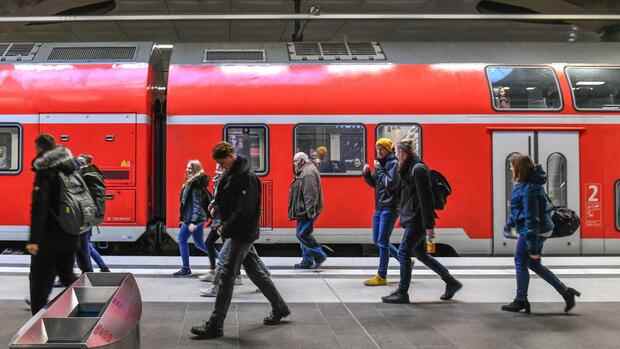The state wants to subsidize local transport.
(Photo: mauritius images / Bildagentur-online/Joko / Alamy)
Berlin In the traffic light coalition there is growing concern that the CDU-governed federal states could stop the planned discount ticket for local transport in the Bundesrat.
“People are looking forward to the ticket, and anything other than its rapid introduction on June 1st from tactical games would produce great frustration,” warned the deputy leader of the SPD parliamentary group, Detlef Müller. “The companies have made enormous efforts to ensure that the ticket is a success, the financing is secured, so failure in the Bundesrat would be embarrassing for the states in the first place,” Müller told the Handelsblatt.
The SPD, Greens and FDP agreed in March to grant a discount for buses and trains in addition to a discount for petrol, diesel and heating oil. According to this, not only is fuel to be subsidized for three months from June, but also local transport via nine-euro monthly tickets.
“Both laws are to come into force at the same time on June 1,” said the transport policy spokesman for the Greens in the Bundestag, Stefan Gelbhaar, the Handelsblatt. “We will secure that in the further proceedings.”
Top jobs of the day
Find the best jobs now and
be notified by email.
CSU describes ticket as a “three-month consolation patch”
The federal states responsible for local transport and also the transport companies had agreed in March after protests to allow the discount. But now the first federal states are giving up again. “If the federal government believes that it can be applauded on the back of the federal states for a three-month consolation and that others should pay the bill, then it has been very wrong,” said Bavaria’s Minister of Transport Christian Bernreiter (CSU).
The federal government must fully compensate for the costs and, above all, “as promised in the coalition agreement, significantly increase the regionalization funds”. “Under the current conditions, I do not see that Bavaria can approve the law in the Bundesrat,” Bernreiter said. Instead of “igniting a flash in the pan”, the federal government should invest more in local transport on a permanent basis.
The CDU member of the Bundestag Michael Donth, who comes from Baden-Württemberg, explained: The government is endangering the existence of the transport companies. “Without a readjustment of the present regionalization law, the marketing gimmick will quickly become a backwards role for climate-friendly mobility.”
Traffic light calls for structural reforms in local transport
SPD parliamentary group leader Müller admitted that the federal government had to “find a solution for the structural underfunding of public transport by the summer”. “We stand by the coalition agreement that public transport must be better financed and that we need a mobility pact between the federal, state and local authorities as a prerequisite for this,” he said.
“The mobility pact is intended to create the basis for better financed local transport. The results of the country consultations must now be available quickly so that further financial talks can be held on this basis.”
It is questionable whether the federal states will get involved or not call the mediation committee in the Bundesrat to secure future financing. They know the transport companies are on their side, as can be seen from their statements for the hearing in the Bundestag Transport Committee this Monday.
Based on forecasts, the federal government wants to provide 2.5 billion euros to compensate for losses caused by the discount ticket. The federal states, however, are demanding further relief from the increased energy prices and, on top of that, permanently 1.5 billion euros more from the federal government for local transport. So far, the federal government has been paying almost ten billion euros a year.
Associations demand an increase in regionalization funds
“If there is no immediate increase in regionalization funds, the authorities in many regions will be forced to cancel transport services because the available funds are not sufficient,” warns the Federal Association for Local Rail Transport, which represents the authorities of the federal states.
Mofair, the association of private railway operators, considers compensation for the increased energy prices to be “particularly urgent”, as does the association of German transport companies. It urgently requires a statutory commitment from the federal government to significantly increase funding.
“We need more federal funds to expand local transport, to intensify it and to test new concepts,” said Jens Hilgenberg from the environmental association BUND. Many people would buy the nine-euro ticket. The question is whether they want to use local transport afterwards. “There is a risk that people will get frustrated from overfull trains,” he told the Handelsblatt.
Deutsche Bahn AG announced over the weekend that it would be offering the ticket from May 23 – provided the law had been passed by the Bundestag and Bundesrat by then.
More on the subject: Chaos in the rail network: why the German chemical triangle has been left behind by the railways
